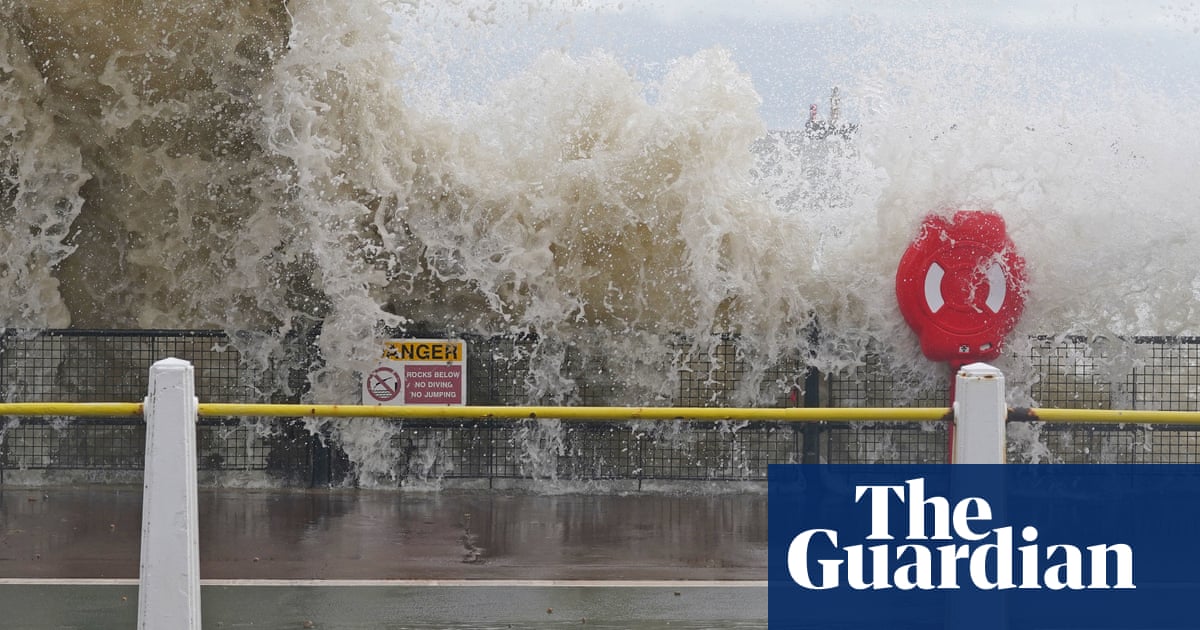Scientists are warning that the UK is not adequately prepared for the potential damage that future storms could cause.

Scientists have warned that the UK is not adequately prepared for the potential devastation that future storms could cause, following the impact of Storm Ciarán on the country.
According to experts, the UK is expected to experience more frequent and intense storms due to the warming atmosphere caused by emissions from burning fossil fuels. This fall, these storms have resulted in flooding for thousands of homes and last week, nearly 150,000 households were left without electricity.
Due to severe weather conditions, schools in Jersey, Guernsey, and Alderney were forced to close. The British Isles also experienced strong winds that caused damage to homes and disrupted train services. The Port of Dover was congested with long queues as a result. In Surrey, the storm caused disruptions to Thames Water’s treatment facilities, leaving thousands without access to water.
Researchers are concerned that the government is not adequately prioritizing measures to prepare for floods, potentially resulting in detrimental consequences such as loss of homes, livelihoods, and even lives.
Professor Trevor Hoey, who specializes in river science at Brunel University London and serves as the director of the Centre for Flood Risk and Resilience, expressed his concern that this issue may not receive the necessary attention due to competing priorities of government at various levels.
We are currently in a state of reacting instead of proactively addressing risks. Typically, we only take action after a flood has already occurred, rather than preventing it from happening in the same location in the future. It is important for us to consider a broader perspective and find ways to both reduce and assist individuals in adapting to climate change on a national level.
Professor Jim Hall, of the Oxford University Centre for the Environment, suggested implementing regular evaluations of flood defenses to ensure a proactive rather than reactive response.
According to him, the National Infrastructure Commission recommended that the government establish a long-term goal to decrease the number of properties at risk of flooding from rivers or the sea. However, it is not possible for the government to completely eliminate the threat of flooding, so it is important to regularly conduct stress tests and exercises to prepare for extreme events that may occur in the future.
The strategy for preventing floods has been to construct large, sturdy barriers to safeguard infrastructure. However, Hoey noted that this method is costly and has significant disadvantages. He explained, “It often results in the degradation of river ecosystems and has notable downsides.” In regions where extensive hard engineering has been implemented, such as Japan, there is now a movement towards transitioning to a more comprehensive approach of natural flood management in order to address the issue at its root.
He stated that constructing on floodplains hinders the proper drainage of excess water because hard surfaces now cover the natural path the water would have naturally taken. This obstruction of natural routes leads to water being diverted and accumulating in certain areas, resulting in the recent flooding seen after Storm Ciarán.
According to Prof Rick Stafford, the chair of the policy committee of the British Ecological Society, it is important to utilize nature-based solutions. He explains that healthy ecosystems can serve as a strong defense against the increasing frequency and severity of storms. For example, peatlands and saltmarshes can act as natural buffers, slowing down water flow and storing excess rainwater, thus preventing flooding in river and coastal areas. Additionally, habitats like kelp beds can reduce the impact of waves on shorelines. While we often associate ecosystems with protecting biodiversity, they also provide valuable services that can help us adapt to the effects of global warming.
According to Hannah Cloke, a hydrology professor at the University of Reading, we are currently not adequately prepared for future challenges. As climate change continues, certain areas in the UK will face increased risks and hazards, such as coastal regions facing rising sea levels or areas prone to landslides and river flooding. Building resilience to storms involves taking preventative measures before a crisis occurs, which may seem costly and unnecessary during favorable weather conditions.
“Being prepared for the worst and remaining optimistic is sound advice. It involves balancing a negative imagination – considering the worst-case scenario – with practical thinking – what steps can I take to prevent or minimize the potential consequences?”
Defra has been reached out to for a response.
Source: theguardian.com


